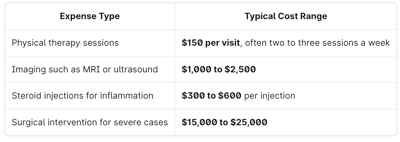5,000+
2,000+
5 Star
Shoulder Bursitis Vaccine Injuries
Vaccine Injury Compensation Claim Lawyer
Shoulder pain after a vaccination can interrupt sleep, limit movement and affect daily tasks in ways people do not expect. Many adults assume this pain will fade quickly, yet bursitis that develops in the days after a flu shot or another vaccination often points to an injury that qualifies for compensation through the Vaccine Injury Compensation Program (VICP).
Our experienced vaccine injury lawyers will review your medical records, confirm whether your shoulder pain is related to vaccine administration and explain your options through the federal program. Request your free consultation to start your bursitis vaccine injury claim.

Awards and Associations
One of more of our attorneys have been recognized for the following:

Hear Cheryl's Vaccine Injury Story
Cheryl, a former client of My Vaccine Lawyer, shares her experience with Shoulder Injury Related to Vaccine Administration (SIRVA) following a flu shot. She describes the sudden onset of pain, limited shoulder mobility, and a long recovery process that led her to seek legal help from attorney Max Muller.
With his support, Cheryl filed a successful claim through the Vaccine Injury Compensation Program and received a settlement covering her medical expenses, lost wages, and pain and suffering. SIRVA symptoms typically include sudden pain within 48 hours of vaccination, restricted range of motion, and discomfort that can last for weeks or months.
What Is a Bursitis Vaccine Injury?
A bursitis vaccine injury happens when the vaccine enters the wrong part of the shoulder and irritates the bursa instead of the deltoid muscle. The result is shoulder pain and inflammation that lasts longer than normal post-vaccination soreness.
Glossary for Bursitis
- Bursa: A small fluid-filled sac that helps the shoulder joint move smoothly.
- Bursitis: Inflammation of the bursa that leads to pain, stiffness and decreased range.
- Bursitis vaccine injury: Bursitis that develops after vaccination because the injection irritated the bursa rather than the muscle.
- Cause: The injury is related to vaccine administration, not the vaccine itself.
- Common triggers: Injection placed too high, incorrect needle depth, or technique errors that affect surrounding structures.
Symptoms of a Bursitis Vaccine Injury
These symptoms often appear after a vaccination when the injection affects the bursa instead of the deltoid muscle. People with bursitis vaccine injury typically report one or more of the following:
- Persistent shoulder pain that does not fade within a few days
- Decreased range or stiffness when lifting the arm
- Pain when reaching overhead or behind the back
- Localised swelling or tenderness around the injection site
- Sharp discomfort triggered by movement
- Symptoms on the left shoulder or right shoulder, depending on vaccination side
- Frozen shoulder or adhesive capsulitis in more advanced cases
When these symptoms start
We are the Highest Rated Vaccine Injury Law Firm in the Country!
SEE OUR NOTABLE SETTLEMENTS
See some of our vaccine injury settlements in the VICP.
See Vaccine Settlements Here
MEET MAX
Max is a founding Partner of My Vaccine Lawyer and has been a Super Lawyer for 11 years straight.
Meet Max
MEET PAUL
Paul is a founding Partner at My Vaccine Lawyer and has been featured in the Washington Post and CBS News for his accomplishments.
Meet Paul
Compensation is Available for a Bursitis Vaccine Injury Claim
A bursitis vaccine injury can lead to months of treatment and unexpected costs. The VICP repays documented losses tied to vaccine administration errors.
Categories the VICP compensates
1. Medical treatment and rehabilitation
Many people with bursitis vaccine injury require ongoing treatment that quickly adds up.

These costs often increase when shoulder joint irritation spreads to surrounding structures or tendons, creating chronic inflammation that requires longer recovery.
2. Out-of-pocket expenses
Routine appointments, specialist assessments and travel can create additional charges. These smaller amounts grow over time and are eligible for review when directly linked to treatment.
3. Lost income
Shoulder pain, adhesive capsulitis or decreased range may affect lifting, reaching or repetitive tasks.

These numbers reflect typical patterns we see in bursitis vaccine injury claims when shoulder movement is restricted.
4. Pain and Suffering
The category of pain and suffering is capped at $250,000.
Examples of compensable impact
- Difficulty sleeping due to shoulder pain
- Trouble lifting, reaching or completing work tasks
- Frozen shoulder symptoms or decreased range that interrupt daily routines
- Discomfort during household activities
- Long recovery after conservative treatments or surgical intervention
These limitations are supported through medical records, physical therapy notes and documentation that follow the progression of the bursitis vaccine injury.
Speak With A Lawyer Now!
Get a Free Consultation & See What Your Claim Is Worth
Have your case evaluated directly from one of our vaccine lawyers.
How these numbers support your Bursitis vaccine injury claim
The combination of treatment costs, lost wages and daily limitations creates a clear financial picture for the Vaccine Injury Compensation Program. An experienced vaccine injury lawyer organizes this evidence so the court can review the full impact of the injury.
Why Choose My Vaccine Lawyer
A bursitis vaccine injury requires legal knowledge and medical awareness. Our team works exclusively with vaccine injury cases and understands how these claims succeed in the Vaccine Injury Compensation Program.
Tile 1: Focused Experience in Bursitis Claims
Our experienced vaccine injury lawyer reviews imaging, treatment records and injection site events to confirm whether the shoulder injury related to vaccination meets the standards of this federal program. This focused practice allows us to build strong cases for clients with bursitis vaccine injury.
Tile 2: Evidence Built for a Federal Process
We prepare claims with the documentation the court expects, from physical therapy timelines to reports showing improper vaccine administration. This approach strengthens claims involving chronic inflammation, decreased range or injuries caused by incorrect needle length or needle depth.
Tile 3: Proven Results for Shoulder Injuries
Our law firm has recovered significant compensation for people with shoulder injuries caused by vaccination, including bursitis, frozen shoulder and adhesive capsulitis. These results reflect our ability to present evidence clearly and support clients through the federal program from start to finish.
1. Contact Your Doctor
If you suffered a vaccine-related injury, adverse effects or worsening symptoms, call your doctor immediately.
Frequently Asked Questions About Bursitis Vaccine Injury Claims
-
Can bursitis after vaccination count as a shoulder injury related to improper injection technique?
Yes, bursitis that developed after vaccination can be considered an injury related to vaccine administration when the injection irritated the bursa instead of the deltoid muscle. This often happens when the needle length required for safe placement is misjudged or when proper vaccination techniques are not followed during adult immunization or early adolescents.
-
Is bursitis after a flu shot the same as vaccination related shoulder dysfunction (VRSD)?
Vaccination related shoulder dysfunction describes a range of shoulder injuries caused by incorrect injection placement. A bursitis vaccine injury is one form of VRSD and can involve inflamed tendons, decreased range and stiffness that may limit a full recovery.
-
Do rotator cuff issues affect my bursitis vaccine injury claim?
A rotator cuff tear or irritation in surrounding structures can appear alongside shoulder bursitis.
These injection site events may strengthen a claim when medical records show the injury started after vaccination and was not present before the shot. -
Does a bursitis vaccine injury mean the vaccine had low vaccine efficacy?
No, bursitis is not related to vaccine efficacy. It is caused by issues related to vaccine administration, such as incorrect needle depth or errors that affect the shoulder joint.
-
What risk factors make someone more likely to develop shoulder bursitis after vaccination?
Body composition, age and injection placement can affect risk. Elderly adults, people with smaller deltoid muscles or those who receive a shot placed too high on the shoulder may face a higher risk of injury.
-
Can I file a claim if the pain started in my left shoulder instead of the right?
Yes, the side of the injury does not affect eligibility. A bursitis vaccine injury on the left shoulder or right shoulder can qualify as long as symptoms began after the vaccination and medical records support the timeline.
-
What if conservative treatment does not resolve my bursitis?
Some patients need prolonged physical therapy or surgical intervention for persistent symptoms.
Documented treatment helps show how the injury affects daily movement and may strengthen your request for compensation in the federal program. -
Do early symptoms affect whether my bursitis vaccine injury claim is accepted?
Yes, timing is one of the strongest indicators that the injury is related to vaccine administration.
Pain, stiffness or reduced movement that begins within 48 hours of vaccination is highly consistent with a bursitis vaccine injury, and symptoms that appear within hours provide even clearer evidence for a claim. -
Who prepares the evidence for a bursitis vaccine injury claim?
An experienced vaccine injury lawyer organizes imaging, treatment notes and records showing how the injection site event caused the bursitis. This preparation helps the court understand how the injury developed and how it affected your shoulder function.
-
Can bursitis from vaccination qualify even if I eventually reach full recovery?
Yes, you may still qualify. The program reviews pain, treatment costs and the duration of symptoms, even if you later regain full movement.
Recent Blogs
How Long Do Flu Shot Side Effects Last?
Paul Brazil: Jan 22, 2026
What is the NCVIA?
Paul Brazil: Nov 10, 2025
Frozen Shoulder After Vaccine
Max Muller: Nov 5, 2025